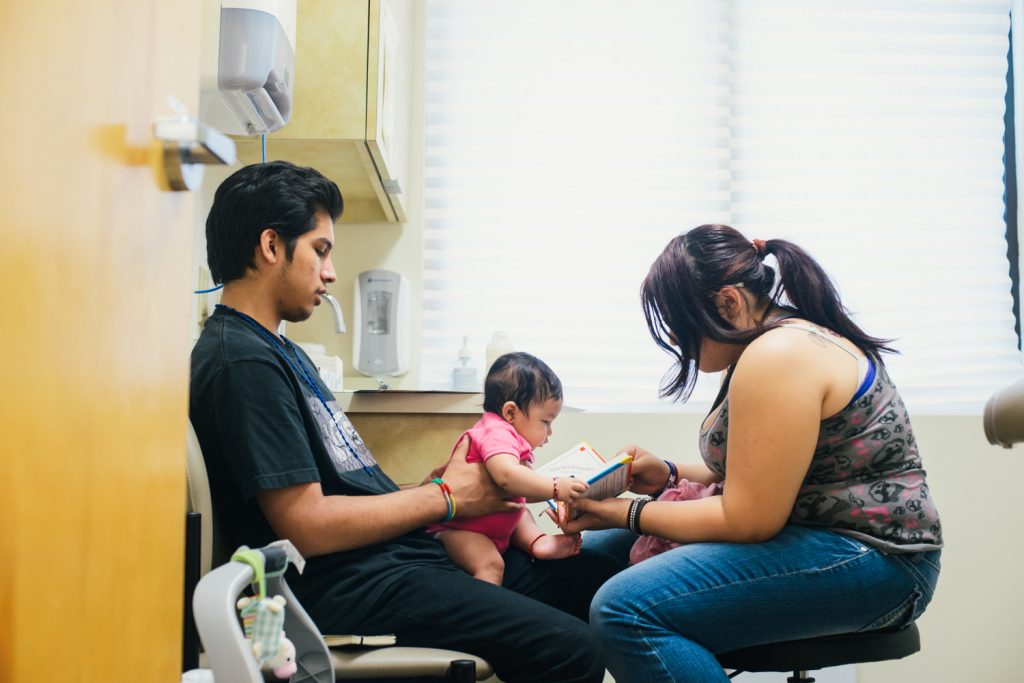Statistics paint a harsh narrative ahead for teen mothers in the United States. The majority are already poor the day they give birth.
Less than half will earn a high school diploma by age 22, and fewer than 2 percent earn a college degree by age 30. Alarmingly, more than 18 percent of teen mothers will become pregnant again within 24 months—a circumstance that greatly increases the chance that she will not finish school and fall deeper into poverty. Studies have shown babies born to teen mothers are more likely to be underweight and drop out of school as adolescents. But the story doesn’t have to end that way. Since 1998, People’s Community Clinic has worked to make sure teen mothers write their own ending.
“If all you hear are those negative statistics, you can feel hopeless,” says Robin Rosell, People’s Director of Social Services. “But when you work with these kids you see that the future is kind of open. They can make these amazing life changes.”
Part of the reason they do is because of services like Tandem Teen Prenatal & Parenting Program that connect pregnant teens with a network of support. Studies show that having just one adult figure who loves you can help offset the absence of another.
“Every time you have a risk factor you have an asset or a protective factor,” Rosell says. “One healthy relationship with an adult. That’s what this program can offer.”
People’s began holding special clinic hours for prenatal teens in 1996. On Friday afternoons the lobby was packed with expecting 16 and 17-year-olds. Most did not have stability at home and many had behavioral issues that required intervention. It quickly became apparent to Rosell and clinic staff that prenatal care was really just the tip of the iceberg for what these girls needed.
She and a team from People’s and partnering agencies spent the next six months devising an intensive case management program that links medical care with integrated mental health services. Two years later Tandem: Teen Prenatal & Parenting Program was born. Tandem is a collaborative effort led by People’s that pools resources and expertise from Any Baby Can, LifeWorks, and Austin Child Guidance Center. Case managers from each agency meet monthly to discuss cases and collectively decide on the interventions each teen will receive. The program works best because people work together.
“It’s a true interagency collaboration. People leave their turf at the door,” Rosell says. “So much of the success of this program depends on the case managers who we hire.” Rosell says.
Case managers serve as mentors for the teens and try to keep them on track to meet their personal and educational goals. They are someone the teens can call in the middle of the night when they need advice. Since the program’s inception the graduation rate of Tandem mothers has increased, in part due to consistency in staffing. But graduation day is a celebration for everyone in the Tandem program. Having a high school diploma opens doors to future employment opportunities and to continuing education and is a milestone that deserves to be acknowledged. In some cases, a teen’s case manager may be the only person in her life telling her that.
Rosell recalls one teen in particular who completed the Tandem program. She was one of the angriest teens she has ever encountered.
“I never saw her smile during the whole pregnancy,” Rosell says.
But it’s her transformation that Rosell remembers. She worked hard to complete her GED and her case manager took her out to lunch for the occasion.
“She had never eaten at a restaurant where you sat down and ordered off a menu,” Rosell says. “She didn’t know what to do.”
The teen has since moved into a place of her own and holds a steady job. This is what Tandem can do for teen mothers. The program makes a three-year commitment to pregnant teens and their families; it is long-term investment in their success. Tandem case managers work to provide stability to young families. The teen couples don’t always last, but Rosell says that’s not the point. The purpose is to teach teens “you don’t have to be with your partner forever, but you have to be a part of your child’s life forever,” she says.
Texas has one of the highest repeat pregnancy rates in the nation at 22 percent. In 2014, the repeat pregnancy rate for Tandem teens was five times lower. Rosell knows Tandem teens still have a tough road ahead. She knows the teens in the program will have good days and bad days. But they are at least on a better path.
“I like working with adolescents,” she says. “There’s so much hope.”
In September, Rosell was awarded Austin Child Guidance Center’s Austin Icon for Children Award for her work creating the Tandem program.

